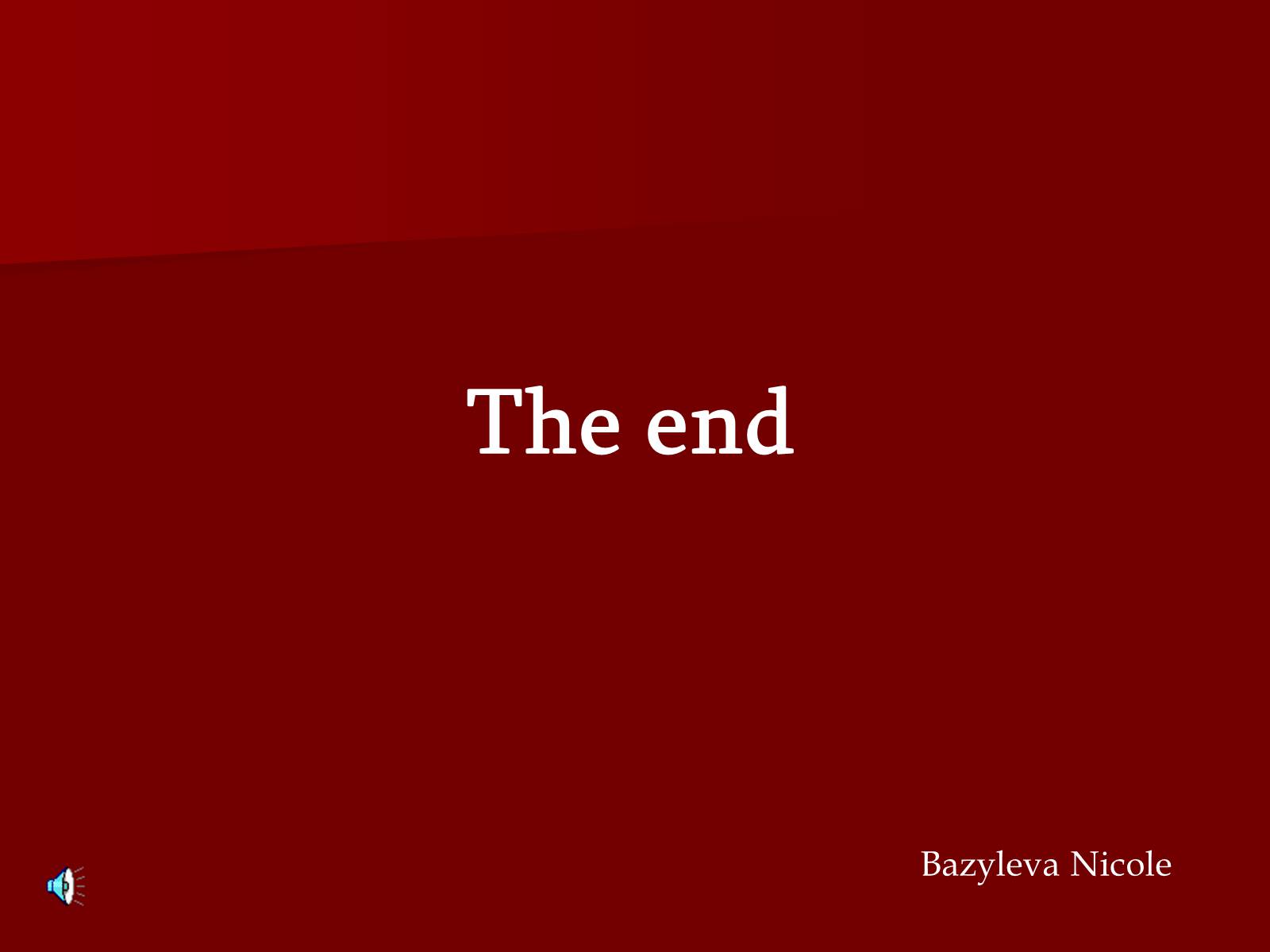- Головна
- Готові шкільні презентації
- Презентація на тему «My Ukraine»
Презентація на тему «My Ukraine»
276
Слайд #1
My Ukraine
There were three brothers: one of them was Kiy,The name of the other one – Shchek, and the third brother was named Khoryv, and the name of their sister was Lybed.Kiy set on the hill that is named Borychev step now,And Shchek set on the hill that is known as ShchekovitsaAnd Khoryv set on the third hill, so that was named after him – Khorevitsa.And the city was created in honour of the eldest brother and the name of it - is Kiev.
«The Tale of Bygone Years»
There were three brothers: one of them was Kiy,The name of the other one – Shchek, and the third brother was named Khoryv, and the name of their sister was Lybed.Kiy set on the hill that is named Borychev step now,And Shchek set on the hill that is known as ShchekovitsaAnd Khoryv set on the third hill, so that was named after him – Khorevitsa.And the city was created in honour of the eldest brother and the name of it - is Kiev.
«The Tale of Bygone Years»
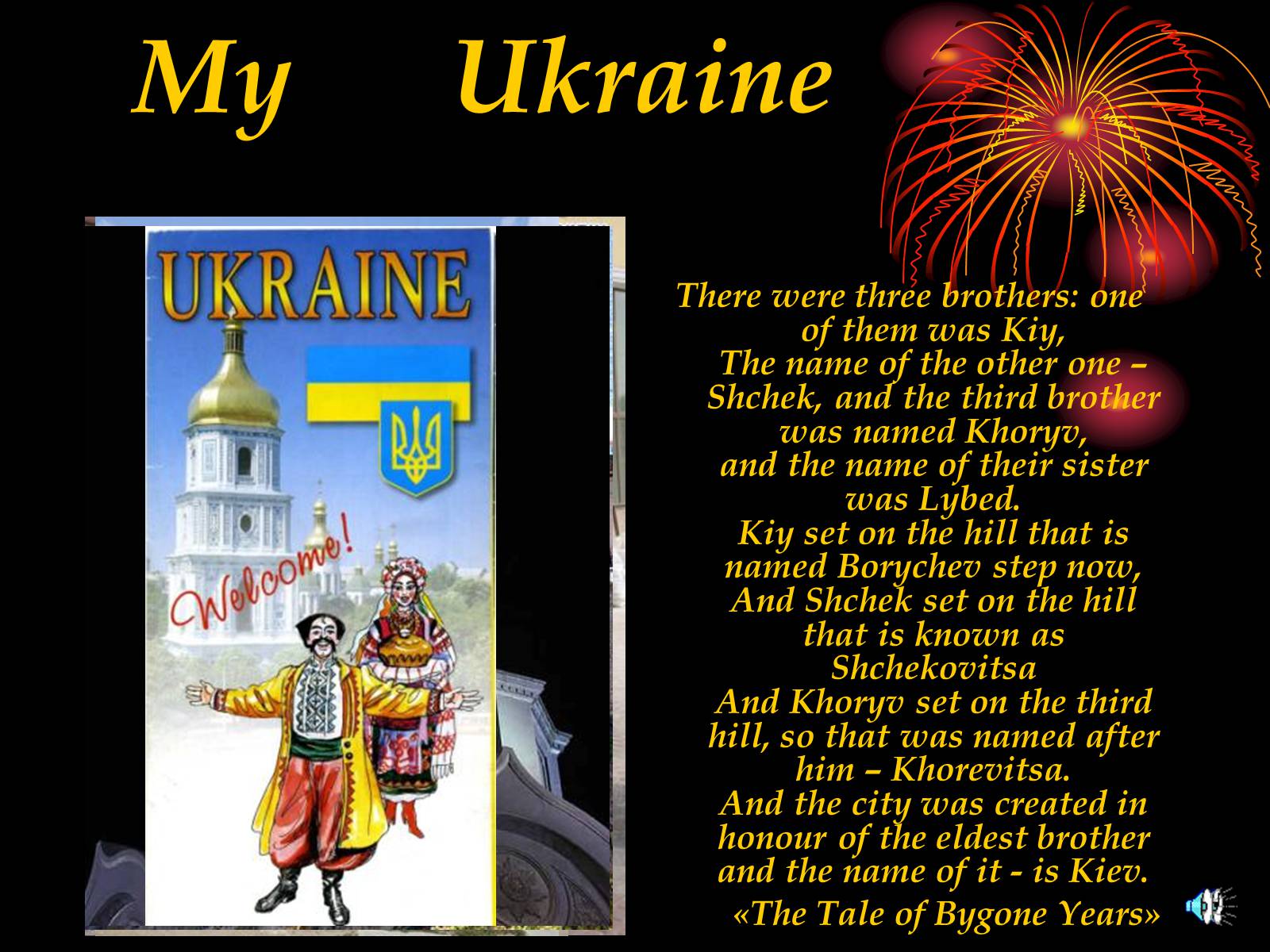
Слайд #2
Ukraine is a country of Central-Eastern Europe with territory of 603, 7 thousand sq kilometers. It stretches for 893 km from North to the South and for 1316 km from West to East. Ukraine is located in moderate latitudes and has outlets to Black and Azov Seas. The capital city is Kyiv.Ukraine has land borders with the Russian Federation, the Republic of Belarus, the Republic of Poland, Slovak Republic, Hungary, Romania and the Republic of Moldova.
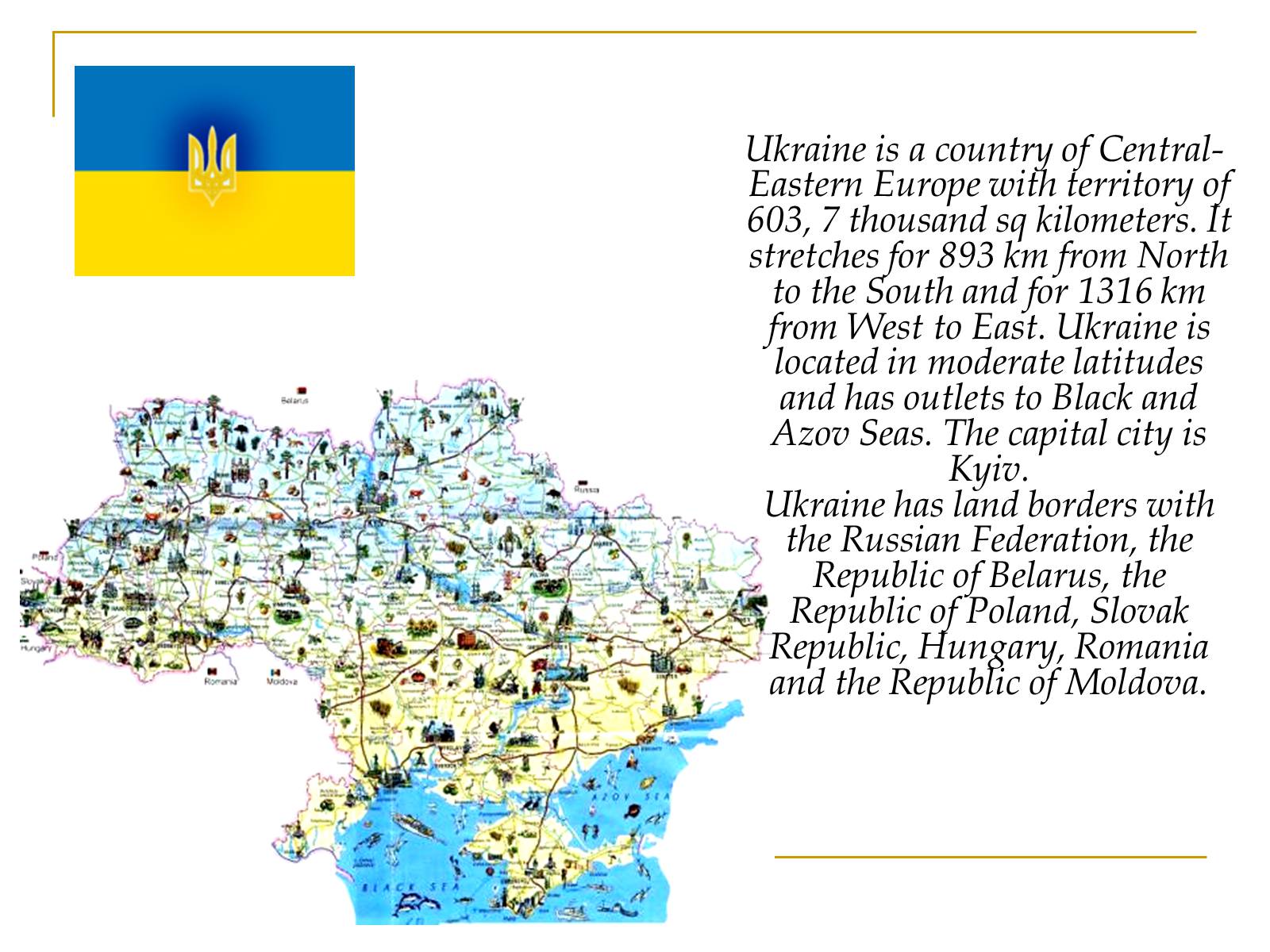
Слайд #3
Ukrainian Culture & Traditions
Ukrainian culture is richly embedded
in ancient traditions. Even today many
historical songs such as the dumy and
the playing of the kobza – which was
popular during the 16th century – is
still enjoyed. However music has also
come a long way since then and Polissia
magic pop and Kolomiya rap tend to be
most popular. The culture scene has also seen a resurgence of Cossack songs and song poetry.
The Ukrainian people also enjoy their culture in the form of traditional dances and dance games. Many of these originated in rural Cossack villages and some of the oldest dances can be traced back to ancient cults. Traditionally many of these dances were performed only by males or females but today both sexes sometimes mix and enjoy the dance together.
Ukrainian culture is richly embedded
in ancient traditions. Even today many
historical songs such as the dumy and
the playing of the kobza – which was
popular during the 16th century – is
still enjoyed. However music has also
come a long way since then and Polissia
magic pop and Kolomiya rap tend to be
most popular. The culture scene has also seen a resurgence of Cossack songs and song poetry.
The Ukrainian people also enjoy their culture in the form of traditional dances and dance games. Many of these originated in rural Cossack villages and some of the oldest dances can be traced back to ancient cults. Traditionally many of these dances were performed only by males or females but today both sexes sometimes mix and enjoy the dance together.
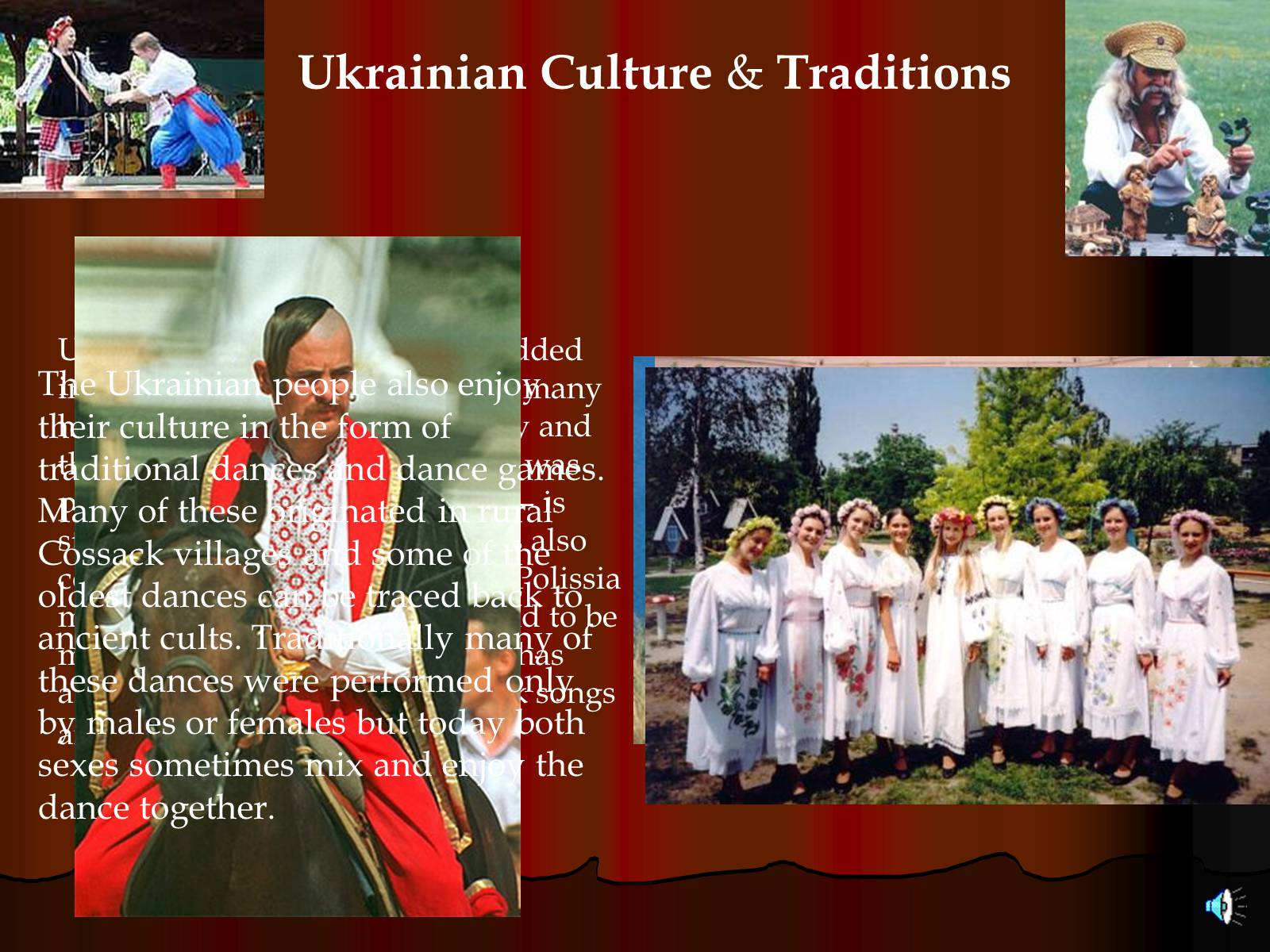
Слайд #4
Kiev - The Capital of Ukraine
Kiev is a sight seeing with
a population of nearly 3
million inhabitants situated
on the Dnipro River, is the
bustling capital of Ukraine.
Ancient Kievan Rus, which
reached its greatest period
of ascendancy during the
11th and 12th centuries.
It was a center of trade
routes between the Baltic
and the Mediterranean.
The city of Kiev and the power of
Kievan Rus were destroyed in 1240
by Mongol invaders and the lands of
Kievan Rus were divided into
principalities located to the West
and North: Galicia, Volhynia, Moscowia and later, Poland, Lithuania, and Russia.
Kiev is a sight seeing with
a population of nearly 3
million inhabitants situated
on the Dnipro River, is the
bustling capital of Ukraine.
Ancient Kievan Rus, which
reached its greatest period
of ascendancy during the
11th and 12th centuries.
It was a center of trade
routes between the Baltic
and the Mediterranean.
The city of Kiev and the power of
Kievan Rus were destroyed in 1240
by Mongol invaders and the lands of
Kievan Rus were divided into
principalities located to the West
and North: Galicia, Volhynia, Moscowia and later, Poland, Lithuania, and Russia.
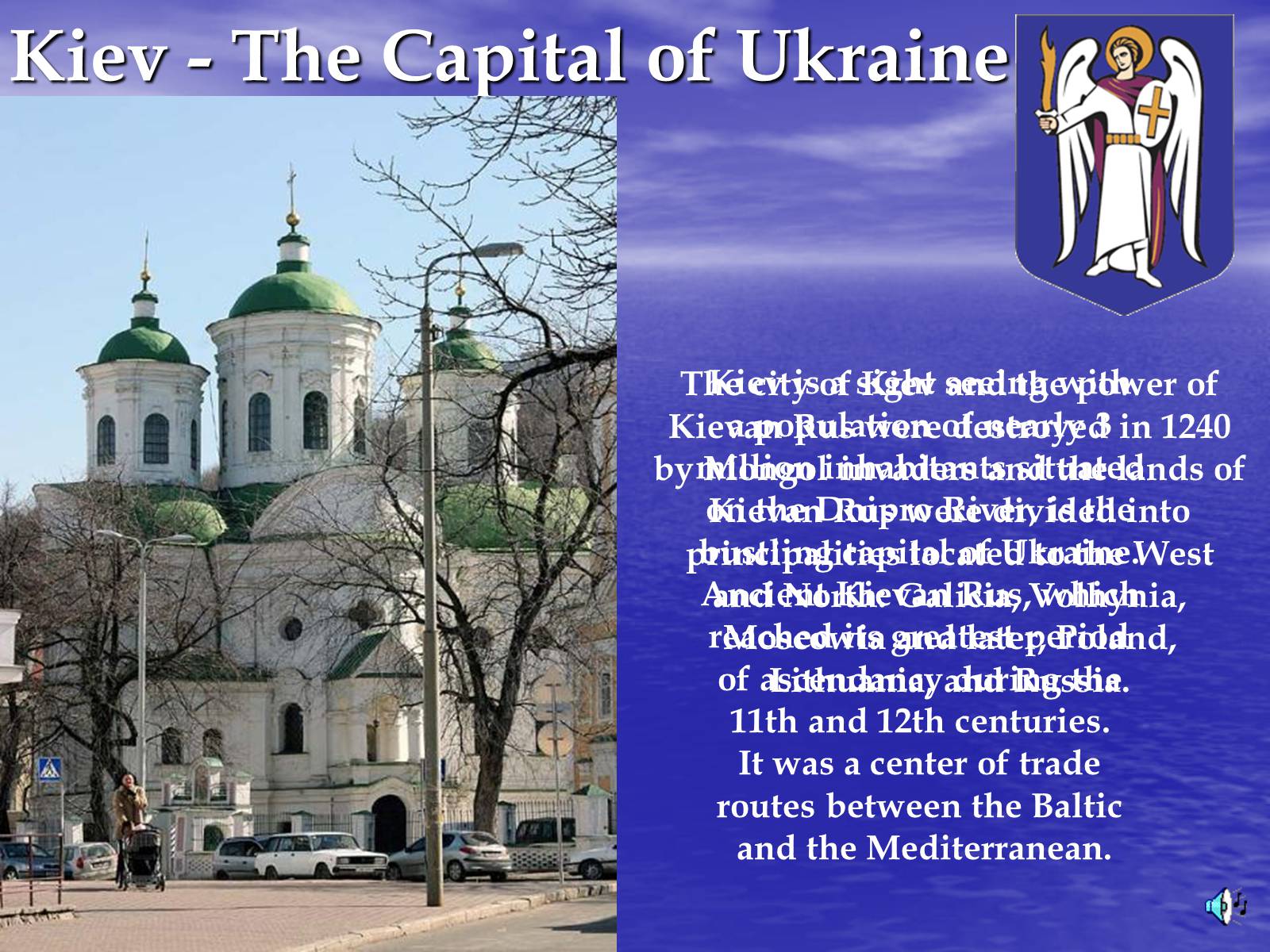
Слайд #5
Lion's town
Once upon a time, many centuries ago, the King of Volyn and Galicia Danylo traveled around his land, accompanied with his son Prince Lev (Lion). Crossing the Poltva River, he looked around and saw the hill not far away. “I will built a town there and the name of it will be Lviv in commemoration of your valor”, said the King.
The Prince kissed the King's hand and replied:
“Oh, father, thank you! I will take a good care of the town named after me!”
Lviv is one of a few cities of Ukraine called “the City of Kings”, complex mixture of Hungarian, Austrian and Ukrainian cultures.
Once upon a time, many centuries ago, the King of Volyn and Galicia Danylo traveled around his land, accompanied with his son Prince Lev (Lion). Crossing the Poltva River, he looked around and saw the hill not far away. “I will built a town there and the name of it will be Lviv in commemoration of your valor”, said the King.
The Prince kissed the King's hand and replied:
“Oh, father, thank you! I will take a good care of the town named after me!”
Lviv is one of a few cities of Ukraine called “the City of Kings”, complex mixture of Hungarian, Austrian and Ukrainian cultures.
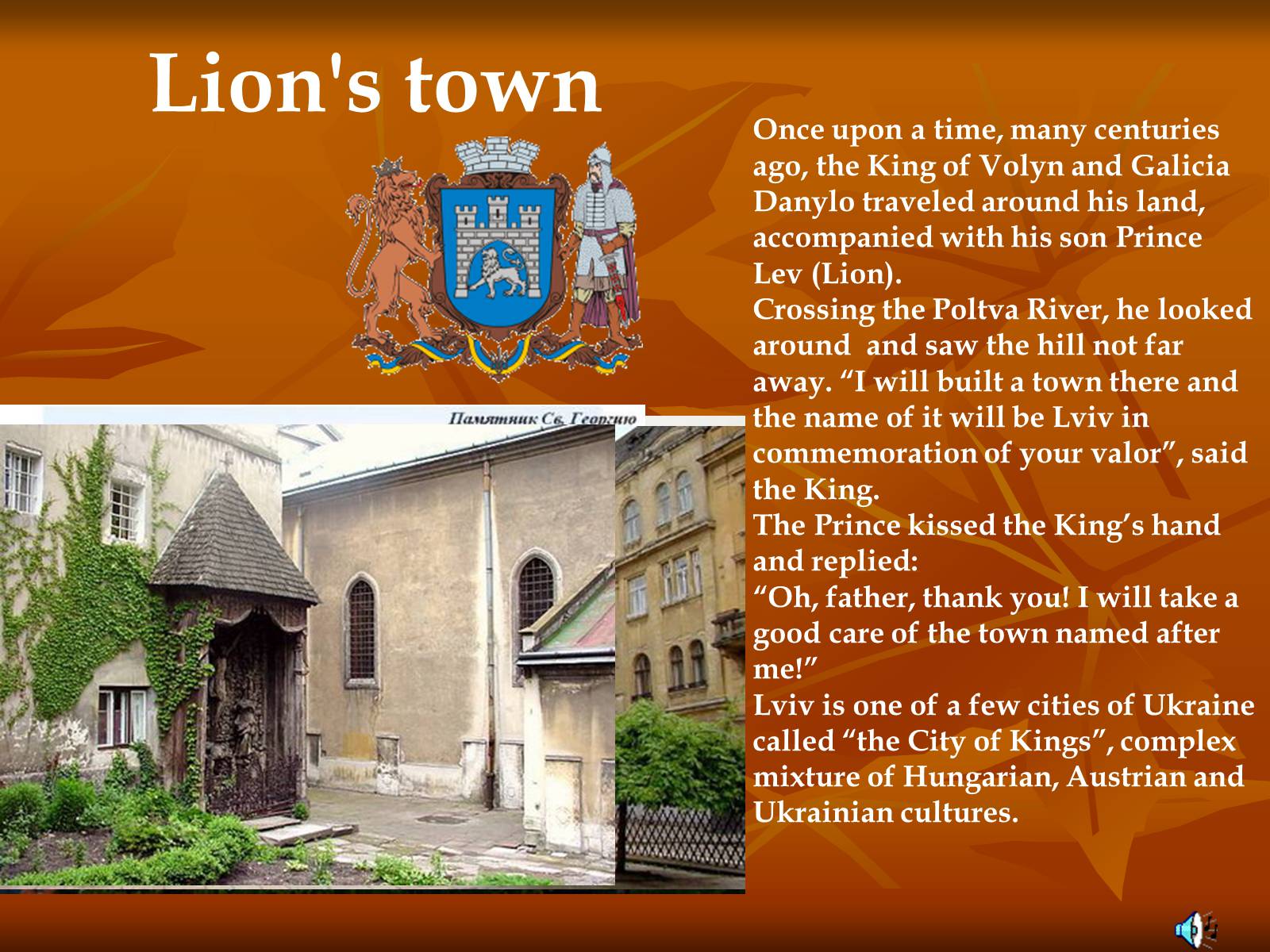
Слайд #6
Odessa - The pearl at the sea
On the Black Sea shore the nature created an amazing spot. In ancient days, its territory
was a home for Scythians, Greeks and Slavs. During the Kievan Rus period, it was a part of the Slavic State.
In the XIIIth century, a territory
of the city of Odessa was
conquered by Tatar-Mongols, in
early XVth century by Lithuania,
and in the midst of the XVth
century was attached to Turkey.
And, finally, in 1791 Odessa
became a part of the Russian
Empire…
Odessa was founded in 1794 by
Catherine the Great. The name of the city came about because of an
error. It was meant to be named after
the ancient Greek city of Odessos
or Ordissos, which was believed
to have been founded in the
vicinity.
Actually, it was somewhere near the present day town of Varna in Bulgaria. However, Catherine the Great liked "Adessa" — as the Russians and Ukrainians pronounce it.Modern Odessa is one of the picturesque cities of Ukraine, “the Southern Gates of the
country”.
On the Black Sea shore the nature created an amazing spot. In ancient days, its territory
was a home for Scythians, Greeks and Slavs. During the Kievan Rus period, it was a part of the Slavic State.
In the XIIIth century, a territory
of the city of Odessa was
conquered by Tatar-Mongols, in
early XVth century by Lithuania,
and in the midst of the XVth
century was attached to Turkey.
And, finally, in 1791 Odessa
became a part of the Russian
Empire…
Odessa was founded in 1794 by
Catherine the Great. The name of the city came about because of an
error. It was meant to be named after
the ancient Greek city of Odessos
or Ordissos, which was believed
to have been founded in the
vicinity.
Actually, it was somewhere near the present day town of Varna in Bulgaria. However, Catherine the Great liked "Adessa" — as the Russians and Ukrainians pronounce it.Modern Odessa is one of the picturesque cities of Ukraine, “the Southern Gates of the
country”.
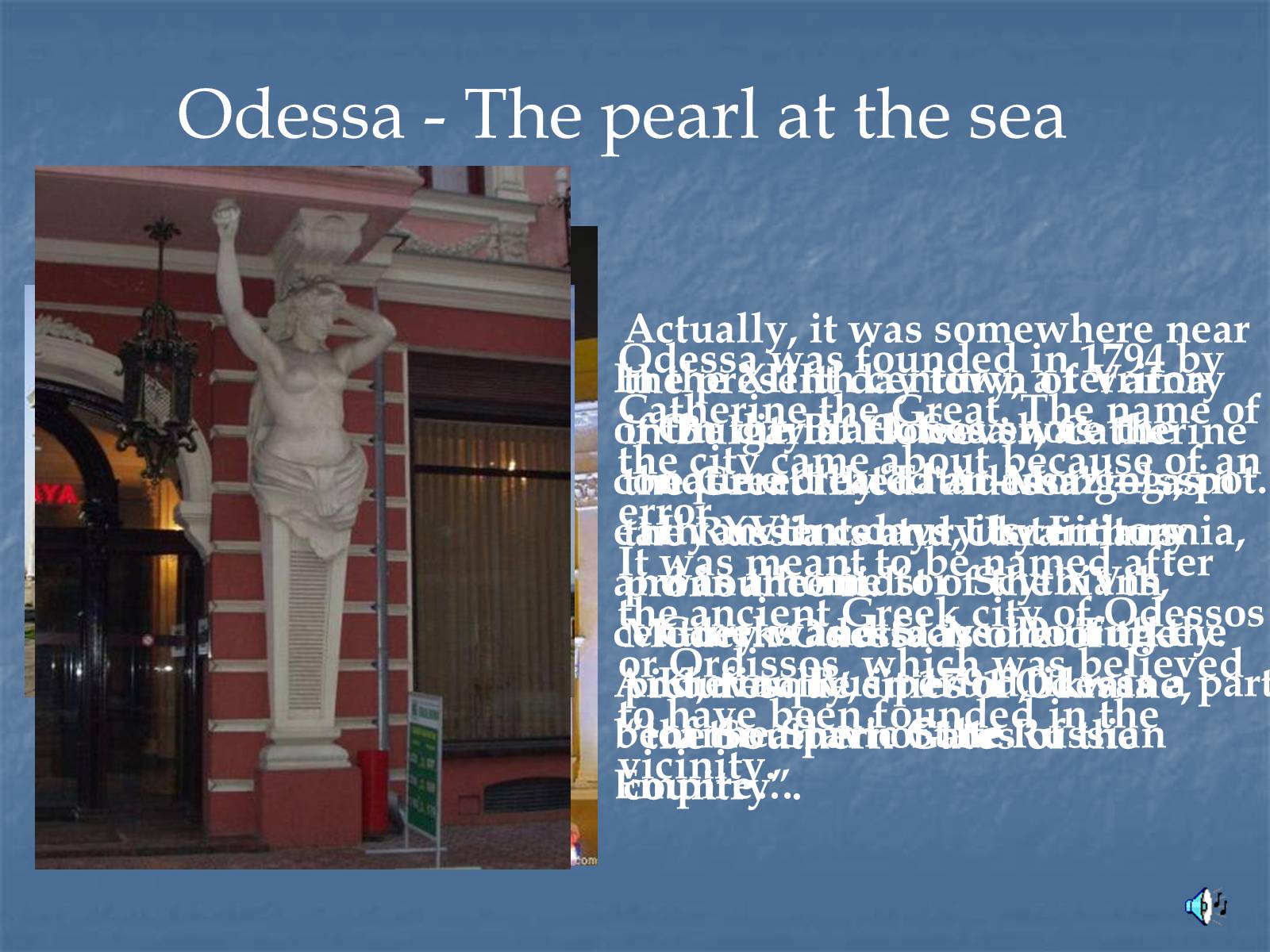
Слайд #7
A Land Rich in Culture, History and Mystery…
Crimea is at the cross-roads of various civilizations, the complex mixture of Oriental and Western cultures, which history absorbed the legends and customs of numerous nations who once upon a time had inhabited its territory: Tauris, Huns, Cimmerians, Greeks, Scythians, Sarmatians, Italians, Tatars, Karaimes and Slaves.
Zaporozhian Cossaks' marchers left
a tangible trace in the history of the
Peninsula as well. The Crimea is a
land of wonderful monuments where
one can find pagan sanctuaries and
magnificent burial mountains and first
Christian churches and ruins of
medieval castles, cave towns along
with luxurious Imperial palaces, ruins
of ancient city-states together with
modern resorts – and all of this in
harmony with picturesque landscapes
and endless seashores.
Perfectly located geographically,
the Crimea region boasts for its
unique subtropical climate.
Crimea is at the cross-roads of various civilizations, the complex mixture of Oriental and Western cultures, which history absorbed the legends and customs of numerous nations who once upon a time had inhabited its territory: Tauris, Huns, Cimmerians, Greeks, Scythians, Sarmatians, Italians, Tatars, Karaimes and Slaves.
Zaporozhian Cossaks' marchers left
a tangible trace in the history of the
Peninsula as well. The Crimea is a
land of wonderful monuments where
one can find pagan sanctuaries and
magnificent burial mountains and first
Christian churches and ruins of
medieval castles, cave towns along
with luxurious Imperial palaces, ruins
of ancient city-states together with
modern resorts – and all of this in
harmony with picturesque landscapes
and endless seashores.
Perfectly located geographically,
the Crimea region boasts for its
unique subtropical climate.
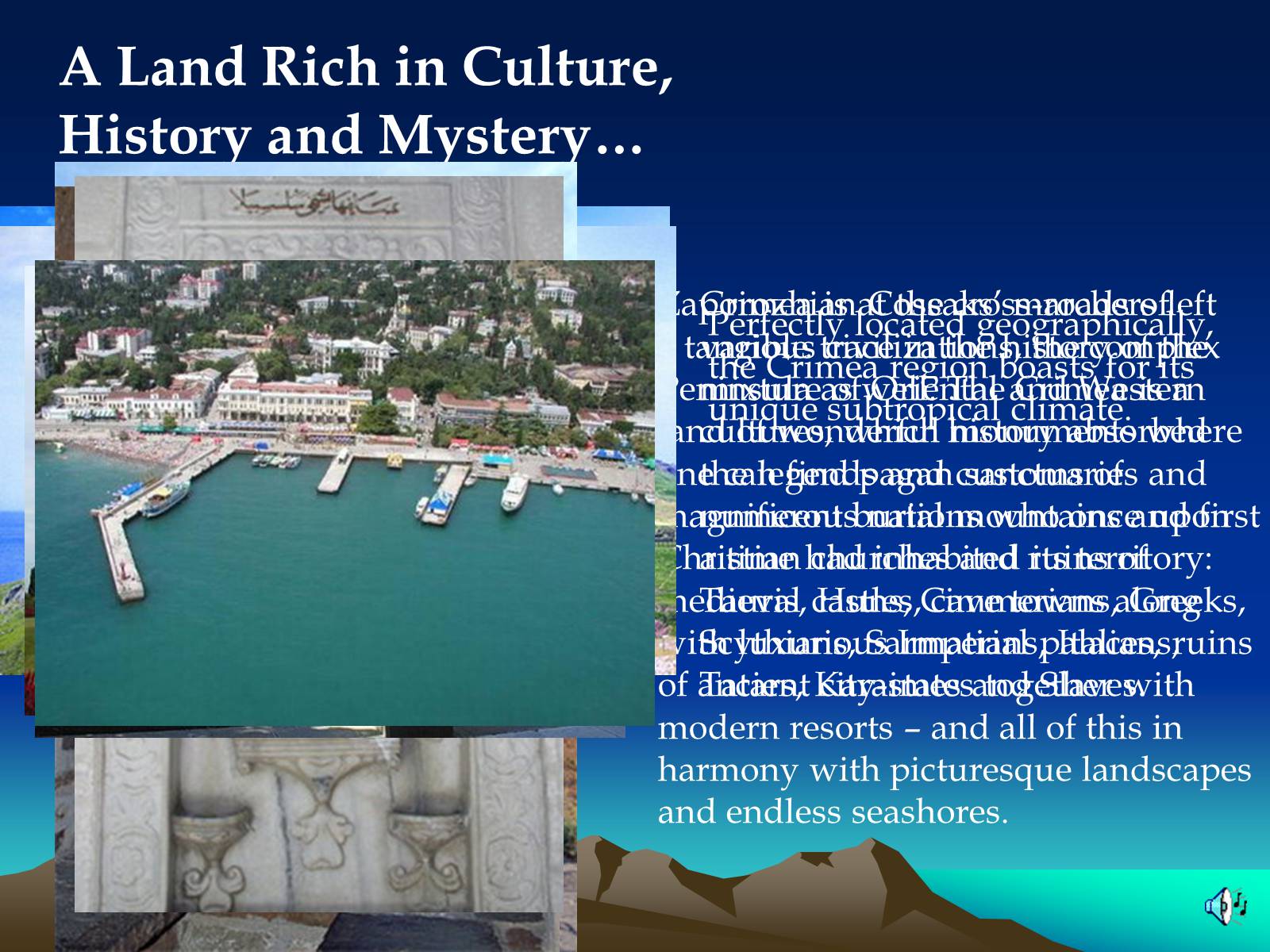
Слайд #8
The Swallowґs Nest is the
emblem of the Crimean Peninsular.
Like a swallow's nest, there is
a 38-metre-high cliff with a
castle which stands overlooking
the sea.
The Swallowґs Nest
In the second half of the 18th
century the property on Cape
Ai-Todor changed its owners
very often. Then it was bought
by one of the oil industrialist's
baron Steingel. He had a dream
to build a romantic castle and he
gave the design to engineer
A. Sherwood.
The "Castle of Love" or "Swallowґs Nest"
was erected in 1912. Its turrets, spires,
crenellations and loopholes give an
impression of unapproachable grandeur.
The castle with its picturesque masses
laid out of stone and lined with lime-
stone, blends harmoniously with the
cliff. Though it looks very fragile it
survived a heavy earthquake in 1927.
emblem of the Crimean Peninsular.
Like a swallow's nest, there is
a 38-metre-high cliff with a
castle which stands overlooking
the sea.
The Swallowґs Nest
In the second half of the 18th
century the property on Cape
Ai-Todor changed its owners
very often. Then it was bought
by one of the oil industrialist's
baron Steingel. He had a dream
to build a romantic castle and he
gave the design to engineer
A. Sherwood.
The "Castle of Love" or "Swallowґs Nest"
was erected in 1912. Its turrets, spires,
crenellations and loopholes give an
impression of unapproachable grandeur.
The castle with its picturesque masses
laid out of stone and lined with lime-
stone, blends harmoniously with the
cliff. Though it looks very fragile it
survived a heavy earthquake in 1927.
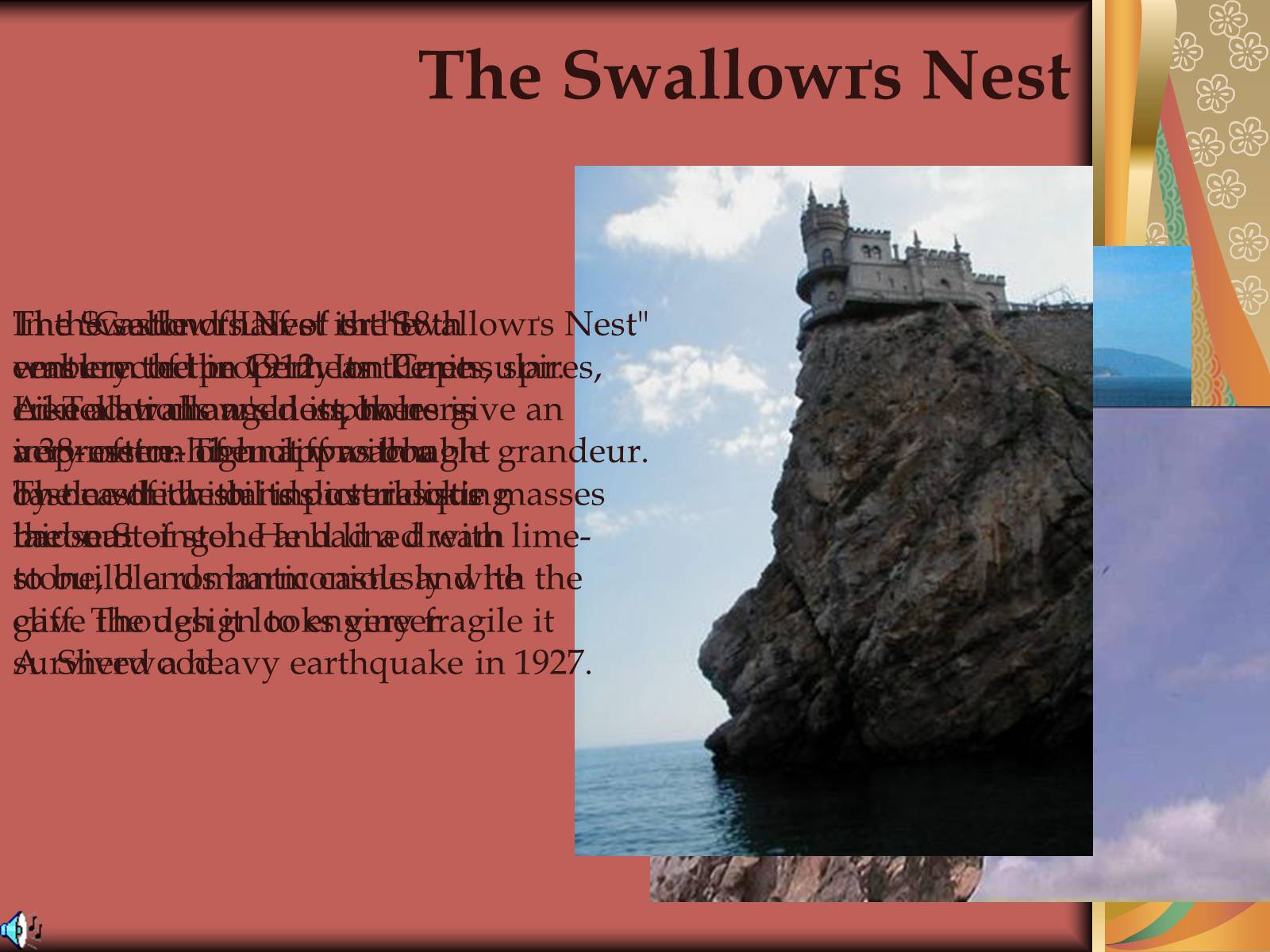
Слайд #9
Sevastopol - in the transfer from the Greek indicates "majestic city", "the city, worth worshipping ". Founders gave this proud name to the city, as if she could predict her future. On the territory of this city more than 1800 historical monuments were found.
Legendary Sevastopol
Sevastopol - pride of our people. “The city on the cliffs – which stood
proudly defended by cliffs. City in the sea - it contains the soul of the sea,
immortal, proud and courageous. Sun City of the south where the sun has
shone for centuries over the dazzling lustre of the military valour."
After being in Sevastopol - city of heroes, city of museums - full with
special solemnity, you will feel the breath of heroic years, you will be
introduced to the names of heroes, who protected her, you will visit
many memorable places in history. Sevastopol and its environment
are rich inmonuments, which imprinted the events of different eras
from remote antiquity to present days.
Sevastopol today is a city of
special administrative status,
a large sea port and naval
base of the Ukrainian and
Russian Fleets, industrial,
scientific and cultural centre
of the South of Ukraine.
Legendary Sevastopol
Sevastopol - pride of our people. “The city on the cliffs – which stood
proudly defended by cliffs. City in the sea - it contains the soul of the sea,
immortal, proud and courageous. Sun City of the south where the sun has
shone for centuries over the dazzling lustre of the military valour."
After being in Sevastopol - city of heroes, city of museums - full with
special solemnity, you will feel the breath of heroic years, you will be
introduced to the names of heroes, who protected her, you will visit
many memorable places in history. Sevastopol and its environment
are rich inmonuments, which imprinted the events of different eras
from remote antiquity to present days.
Sevastopol today is a city of
special administrative status,
a large sea port and naval
base of the Ukrainian and
Russian Fleets, industrial,
scientific and cultural centre
of the South of Ukraine.
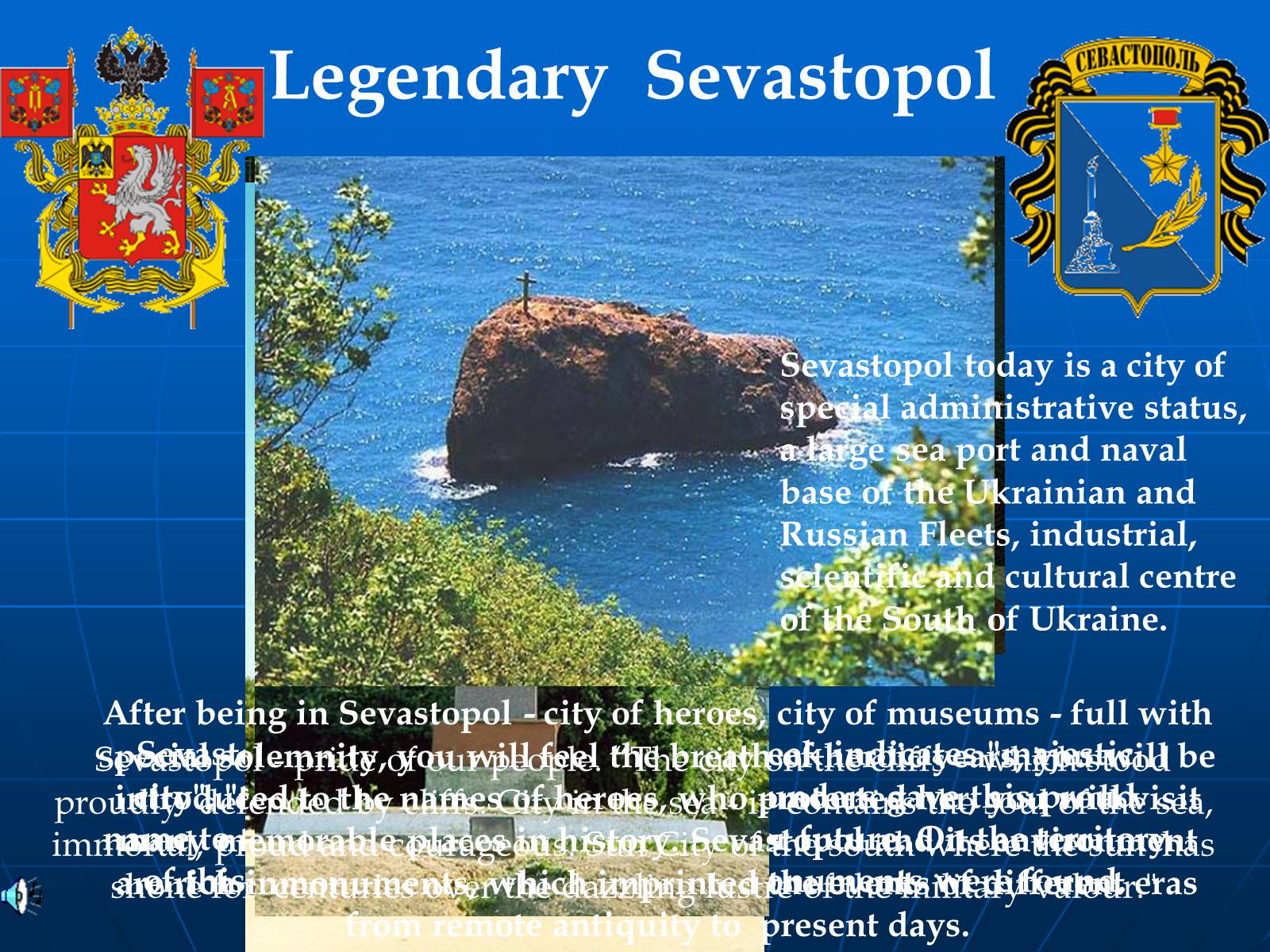
Слайд #10
National preserve "Chersonesus Tavricheskiy" is created for the
purpose of retention and effective
use of a unique historical cultural
complex of the monuments of the
ancient city. Burnt and destroyed
by nomads at the end XIV C.,
Chersonesus several centuries lay
in the ruins.
National preserve "Chersonesus tavricheskiy"
Ancient Chersonesus was the last Greek colony emerged on the north coast of the Black Sea: it was founded in 422 BC.
Chersonesus existed for 2000 years. Agriculture, construction, pottery-making, bone-carving, and some other crafts flourished there.The town was surrounded by powerful fortification walls, contracted according to design, widespread in the Greek and Roman worlds.
For about 170 years the territory has been studied by archaeologists. More than one third of the town has been escalated. Among the archaeological finds are objects of exceptional value.
Museum collections amount to more than 200,000 exhibits. Chersonesus is a sacred place for all Orthodox Christians – it was here where the
Great Prince Vladimir of Kiev was baptized in 988 A.C.
purpose of retention and effective
use of a unique historical cultural
complex of the monuments of the
ancient city. Burnt and destroyed
by nomads at the end XIV C.,
Chersonesus several centuries lay
in the ruins.
National preserve "Chersonesus tavricheskiy"
Ancient Chersonesus was the last Greek colony emerged on the north coast of the Black Sea: it was founded in 422 BC.
Chersonesus existed for 2000 years. Agriculture, construction, pottery-making, bone-carving, and some other crafts flourished there.The town was surrounded by powerful fortification walls, contracted according to design, widespread in the Greek and Roman worlds.
For about 170 years the territory has been studied by archaeologists. More than one third of the town has been escalated. Among the archaeological finds are objects of exceptional value.
Museum collections amount to more than 200,000 exhibits. Chersonesus is a sacred place for all Orthodox Christians – it was here where the
Great Prince Vladimir of Kiev was baptized in 988 A.C.
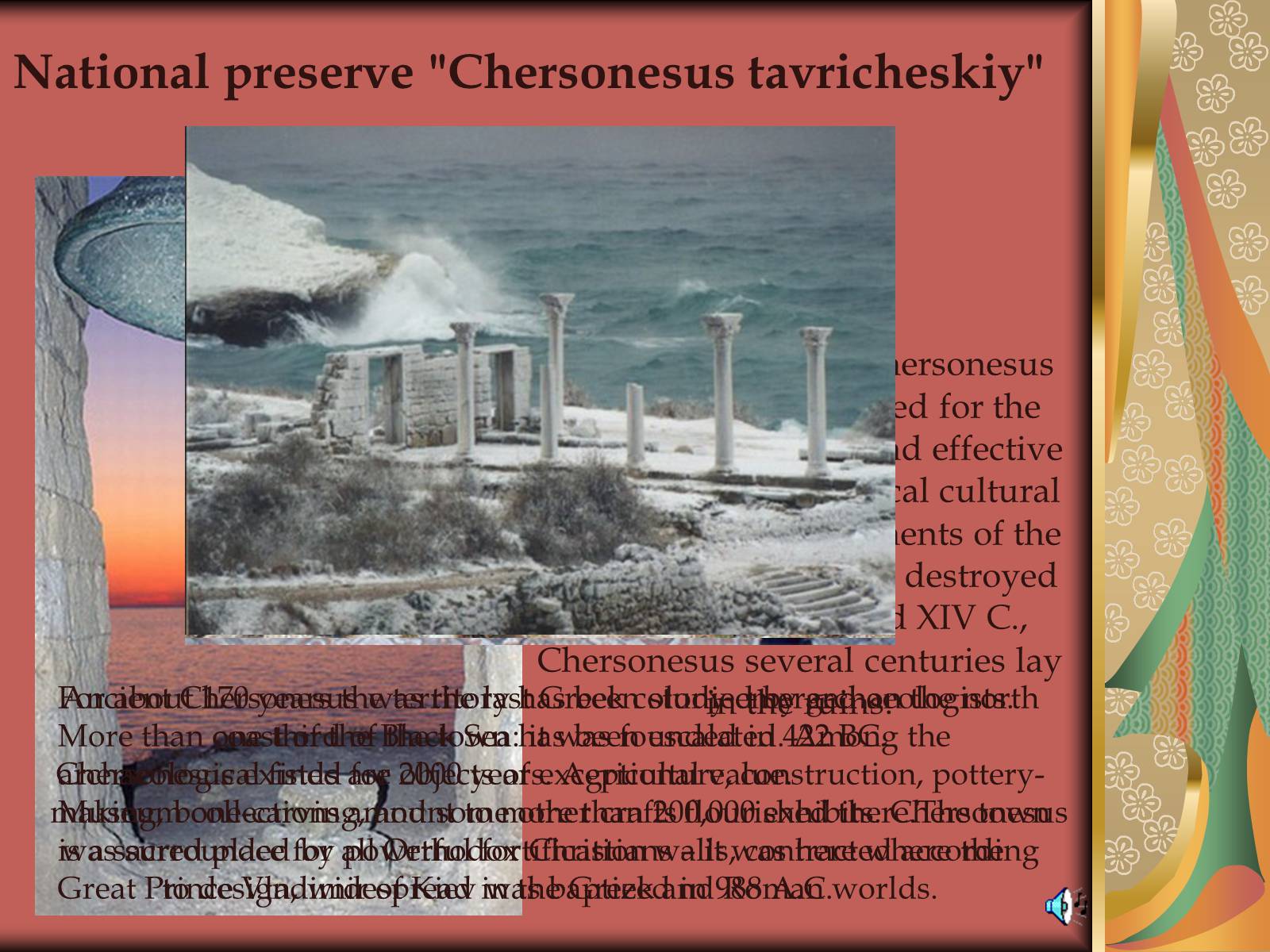
Слайд #11
The end
Bazyleva Nicole
Bazyleva Nicole
